Building Briefs – November 23rd
- Additional funding for Scotland’s canals
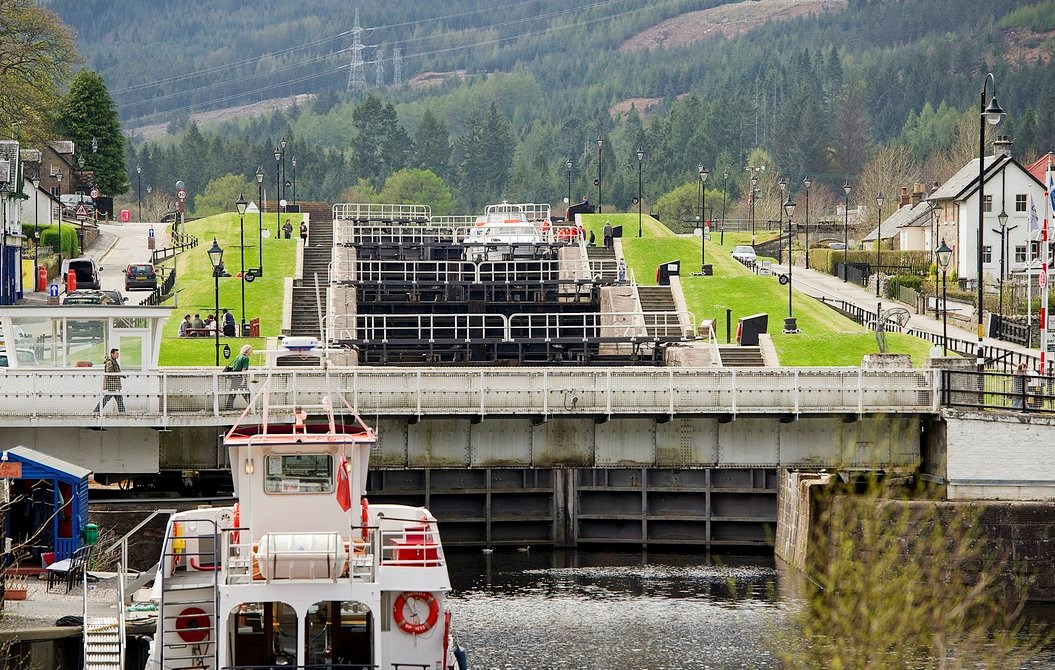
The lock gates at a key location on the Caledonian Canal are to be replaced as part of an additional £5.35 million of capital funding for Scottish Canals, the organisation which manages the canal network in Scotland.
This additional funding follows continuing discussions between Scottish Canals and Transport Scotland about the challenges involved in maintaining the historic assets on the canal network and the publication in June this year of Scottish Canals’ Asset Management Strategy.
Transport Scotland is making the investment to allow Scottish Canals to replace the lock gates at Fort Augustus and undertake additional capital projects, which include improvements and upgrades to assets across the network as well as projects which support income generation for reinvestment in the canals.
- Inverness sales advisor declared best in the country
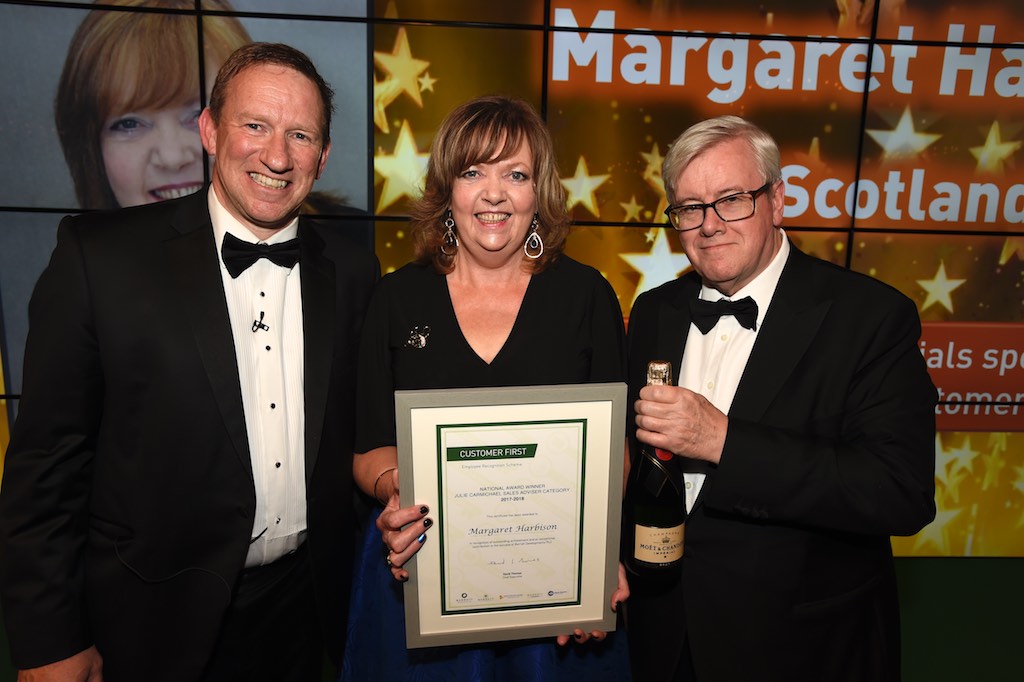
After a tough competition a Barratt Homes sales advisor from Inverness has been crowned as the company’s national sales advisor of the year.
Margaret Harbison, who works at the housebuilder’s community of Ness Castle, beat off competition from across the UK to take home the accolade at Barratt Homes’ ‘National Annual Customer First Awards’.
Held at the Celtic Manor Hotel in Newport, the awards recognise the talent and dedication of Barratt Homes’ top employees from across the UK. Other awards on the evening included Apprentice of the Year, Individual Excellence and Site Manager of the Year.
Talent isn’t in short supply at Ness Castle as site manager Jeff Calder won a prestigious award at this year’s annual NHBC ‘Health and Safety Awards’. The award recognises those who display the highest standards of health and safety and deliver excellence throughout the business.
- Milnbank Housing Association secures new £10m bond deal
Milnbank Housing Association has completed an £8.5 million borrowing deal with GB Social Housing which, on completion of the bond, has achieved almost £10m in cash proceeds sought by the Association.
GB Social Housing tapped its £2 billion bond programme with a £16.5m issue on November 14, funding two new borrowers in Milnbank and Bro Myrddin Housing Association (£8m).
Drew McPhail, finance manager at Milnbank Housing Association, told Scottish Housing News the deal was a long time in the making.
He said: “Milnbank Housing Association has secured and completed a new and very competitive £10m funding facility with GB Social Housing on Wednesday 14th November. The facility is written over 20 years and attracted strong support from the capital markets. This allowed the Association to redeem and re-structure part of its existing short-term debt whilst also generating considerable headroom for further facilities if and when required.
“The Association also achieved significant security release from its existing structure to further strengthen it’s free security position. This places the Association on a strong financial footing to cope with any future shocks and risks that may arise across the sector.
“The funding will see the Association continue to invest heavily in its stock and the area in general to the benefit of tenants, owners, other customers and the local community alike.”
- Sod cutting marks new council homes in Cumbernauld
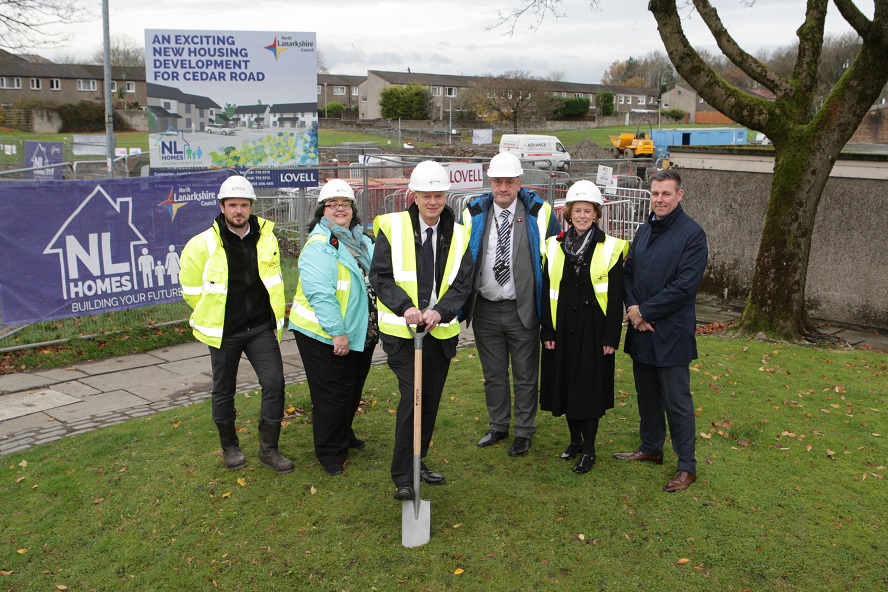
(from left) Kevin Kelly, Lovell assistant site manager; local councillor Claire Barclay; Councillor Allan Graham, convener of enterprise and housing (cutting the sod); Bob Brownlie, area manager, Pamela Humphries, head of housing programme and Kevin McColgan, Lovell interim regional managing director
The first sod was cut on ground in Cedar Road, Cumbernauld, marking work beginning on another new council housing development for the area.
The latest development forms part of North Lanarkshire Council’s new house building programme to deliver 5,000 new homes by 2035. To date it has completed 633 new homes with others nearing completion and at various stages of design. Cedar Road will consist of 14 homes – a mix of one and two bedroom properties - and is being delivered by developer Lovell.
Cutting the sod was Councillor Allan Graham, convener of enterprise and housing, who was joined by representatives from North Lanarkshire Council, developer Lovell and Councillor Claire Barclay.
The Scottish Government contributes towards the development costs of each site.
- Housing minister visits new River Clyde Homes development

(from left) Minister Kevin Stewart, resident Anne Deighan, Cruden managing director Allan Callaghan, chair of RCH Board, Jillian Moffat and local MSP for Greenock and Inverclyde, Stuart McMillan MSP
Kevin Stewart, minister for local government, housing and planning, visited Slaemuir in Port Glasgow to hand over the final house of a new £5 million 28-home development to its new resident.
Two years ago, River Clyde Homes completed a consultation exercise to gather residents’ views on the future of the 13 maisonette blocks in Slaemuir. They were given the option of continued maintenance and repair or their homes. The outcome showed a clear indication that the majority of owners and tenants expressed the opinion that these blocks should be demolished and replaced with new homes.
The new 28 homes are just the first phase and once the next two phases are built the overall Slaemuir development will comprise 96 new homes, built in partnership with the Scottish Government and Cruden Building.
This is the latest development in River Clyde Homes’ ambitious plans to build up to 750 new homes over the next five years and the first of ‘RCH+’ standard, where all properties will have a common design standard, across all future new build sites.
- £8m funding for improvements to council homes in Inverness
The Highland Council is to invest over £8 million into carrying out improvements to its housing stock in the Inverness area.
At yesterday’s meeting of the City of Inverness Area Committee, councillors agreed a two year Housing Revenue Account Capital Programme that will see £8,002,023 spent on making improvements to Inverness council homes over the next two years.
On top of this funding, an additional £600,000 will be ring-fenced to provide aids and adaptations to assist tenants requiring extra support to stay living in their homes as long as possible.
The council is responsible for maintaining 4344 homes across Inverness Area.
During 2019/20, £3,903,512 will be used to carry out upgrade works, including: replacing kitchens, bathrooms, windows and doors, rewiring, heating replacements as well as structural works to the external fabric of properties. Money will also be used to carry out heating and energy efficiency work in line with the Scottish Government’s Energy Efficiency Standard for Social Housing.
For the period 2020/21 the investment will rise to £4,098,511.
- Additional funds agreed for affordable housing supply in East Dunbartonshire
East Dunbartonshire Council has agreed to increase the capital budget for its open market purchase scheme from £1.33 million to up to £3.9m for 2018/19.
The decision supports Priority 1 of the council’s Local Housing Strategy which is to enable a suitable, efficient and affordable supply of housing.
In recent years the council’s Housing Development Programme has delivered around 100 new build social houses for rent each year and the open market purchase scheme is intended to supplement this.
To date, 13 properties have already been purchased and in the region of 35 in total may be purchased with the additional budget allocation. Council agreed to consider future budgets for open market purchase as part of the wider Housing Capital Budget for 2019/20 and beyond.
- South Ayrshire councillors to consider high-rise flats consultation
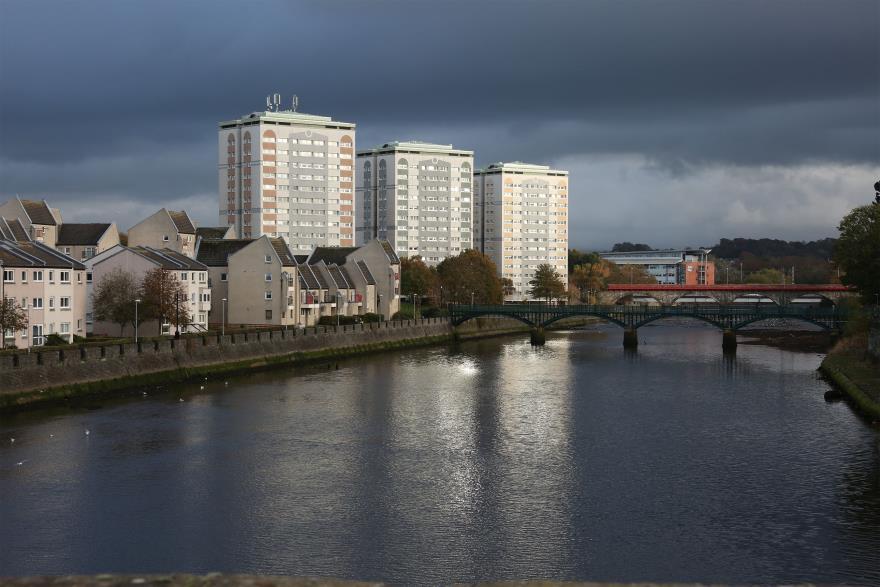
Councillors in South Ayrshire will be asked next week to give the green light to a consultation with tenants on the future of the three high-rise blocks of flats at Riverside Place in Ayr.
The proposal will be put to councillors when they consider the findings of a structural survey of the buildings at South Ayrshire Council’s Leadership Panel on November 27.
The survey confirms that – in addition to the planned improvement works that are currently on site – further “essential and advisable” works have been identified.
These include the removal of the external cladding, existing timber and aluminium windows, and pitched roof covering; new insulated render system; full rewiring; new heating and hot water systems; upgrading the sprinkler system; and upgrading passenger lifts.
Given the extent of the works required and the disruption these would cause, the advice from experts is that each block of flats would need to be empty for up to one year, which would have a significant impact on current tenants at Riverside Place.
Alongside this, the additional costs for the identified works – including costs to decant tenants and the related loss of rental income – are estimated to be in the range of £28 million to £35m.
Taking all of this into account, the report to the Leadership Panel will ask councillors to approve a formal consultation with tenants on the survey findings as well as the alternative options available to provide them with suitable homes.
Options that will be explored as part of the consultation are likely to include refurbishment of the existing buildings in line with the identified works, potential demolition of the Riverside Place flats and new-build housing on the same site, new-build housing in other parts of Ayr, and consideration of the use of the council’s existing housing stock.
The Leadership Panel report, ‘Multi-Storey Flats – Riverside Place, Ayr’ is available at www.south-ayrshire.gov.uk/riverside-report.
- Caledonia Housing Association and Sidey to start work in Kirkintilloch
Caledonia Housing Association has awarded Sidey a £488,000 building improvements contract for work at its Harestanes properties in Kirkintilloch.
The work will be carried out to 94 properties, marking the start of Caledonia’s property improvement plans for the former Antonine Housing Association properties.
The four-and-a-half month contract will see windows replaced in 53 properties, windows and doors replaced in a further 31 properties and the doors replaced in 10 properties. Work is expected to begin on November 26 and is hoped to be completed by early April 2019.
- Final roadworks set to safeguard Fettercairn Arch
The closure of the Fettercairn Arch (B966) for five days from next week will allow for earlier improvement works to be completed.
Works undertaken last month could not be completed due to the delay in the delivery of materials and components for the project.
Now that the goods have been delivered, Aberdeenshire Council said work can now go ahead to complete the improvements to the road infrastructure.
Previously Large Goods Vehicles (LGVs) have attempted to access the village via the archway which has caused damage to the Historic Environment Scotland structure.
The installation of concrete bollards, large flower planters and improved traffic signage will prevent LGVs attempting to travel underneath which will create a safer travel path for vehicles under the arch.
There will be no access to the village via the iconic arch for five days from Monday, November 26 to Friday, November 30.
Site signage will indicate the temporary diversion route for traffic to the south-east of the village, and the alternative route via: B966, U106K local road, B974 and vice versa.
- Final consultation on Shetland Islands development plan
Shetland Islands Council has announced a final public event to allow people to express their views on proposed development for the village.
Earlier this year, ‘Re-create Scalloway’ community workshops and engagement sessions with a variety of age groups brought forward a number of aspirations. These included suggestions for transport improvements, potential housing sites, more or better community facilities, and potential business opportunities.
This weekend will see public drop-in sessions at the Scalloway Youth Centre, on Saturday from 3-6pm, and on again Sunday from 12-6pm, with “Soup and sweet” available from 12-2pm. There will be a public presentation at the Youth Centre on Sunday at 4.30pm on ‘Findings so far and next steps’.
- Stirling pools closed for emergency repairs
Stirling Council has announced that all swimming pools at The PEAK are to be closed until March 2019 due to urgent emergency repair works.
Problems with the concrete layers of the main pool were discovered during planned repair and cleaning works on 12 November and both Active Stirling and Stirling Council are now in the process of carrying out further investigations.
The initial repairs were scheduled to last five weeks but it has become clear that major work is now needed and the pools will remain closed until this is completed.
Councillor Chris Kane, convenor of the community planning and regeneration committee, which oversees Sport and Physical Activity as well as the partnership with Active Stirling, said the situation was obviously disappointing but sadly unavoidable.
- Report advocates community ownership as ‘routine option’ for Scottish communities
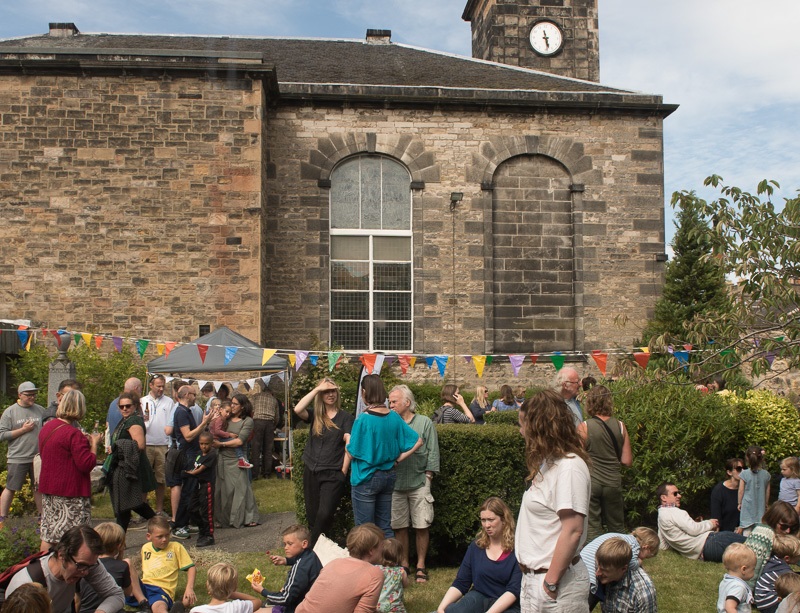
Community ownership should become a normal and realistic option for communities to acquire land and assets, according to recommendations in a new report published today.
Prepared for ministers by the Scottish Land Commission, the report follows a review of existing community right to buy mechanisms and community ownership in Scotland.
The report makes a number of recommendations to Scottish Ministers for the future of community right to buy; in particular, that community ownership should become a routine option for communities, so it is planned and proactive rather than reactive.
Informed by research by a team led by Scotland’s Rural College (SRUC), the report considered the experience of community ownership in Scotland over the last 25 years since the first buy out in Assynt.
The Commission will now work with Scottish Government to bring interested stakeholders together to shape the policy tools and specific interventions needed to deliver the recommendations in the report.
The Scottish Land Commission is now undertaking work looking at international experience of community land ownership to inform the long-term vision and delivery.
- 2020 smart meter target ‘will not be met’ as Scotland lags behind rest of UK
The UK Government’s target of installing smart meters in every home by 2020 will not be met with the cost of the rollout likely escalate beyond initial expectations, according to the spending watchdog.
The National Audit Office (NAO) said today that the Department for Business, Energy and Industrial Strategy (BEIS) expected the cost of the programme to be £11 billion in 2016, equivalent to £374 per dual fuel household.
But it has now found the figure “underestimates the true cost of rolling out smart meters” and has since increased by at least £0.5 billion, equivalent to an extra £17 per household.
Up to 53 million smart meters, which will replace traditional electricity and gas meters in homes and businesses, were due to be installed across Britain by the end of 2020 to meet the government’s target, saving households an average of £18 a year between 2013 and 2030 after they have met the costs of the programme.
However, the rollout has struck a number of issues, with the NAO finding that about 70% of first generation SMETS1 meters “go dumb” when people switch to a new supplier.
Significant technical delays resulted in the first smart meters only being installed in July 2017, over three years later than first planned. In their absence, energy suppliers have installed 12.5 million SMETS1, 7.1 million more than the 5.4 million planned by BEIS.
Because the start of the SMETS2 rollout was significantly delayed, sticking to the 2020 deadline is putting increasing timetable pressure on the programme, the NAO said. This increases the risk of cost escalation and/or technology being rolled out before defects have been addressed.
The NAO also found that installation of SMETS2 meters in the north of England and Scotland was lagging behind the rest of Great Britain due to problems integrating them with communications infrastructure, with just 3,000 of them in place as of the start of November compared to 106,000 in the rest of Great Britain.
The NAO also criticised energy suppliers for “falling short of their obligation” to provide consumers with advice on how to save energy, which was likely to limit how much money they could save with their smart meters.
However, the NAO concluded: “The facts summarised above, and many more, are not fatal to the viability and value for money of the programme.
“However, there are serious issues that need to be addressed if smart meters is to progress successfully and deliver value for money.”

















